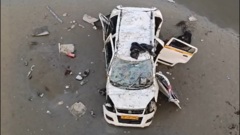The recent loss of three lives in a car accident in India has intensified scrutiny of Google Maps, spotlighting the vulnerabilities of reliance on navigation apps. The incident occurred in Uttar Pradesh when the men, traveling to a wedding, followed the app's directions and veered off a bridge that had partially collapsed due to flooding. While local residents were aware of the bridge's perilous condition, the visitors were not, as no warning signs or barricades were present.
Authorities are investigating the crash and have named four engineers from the state’s road department and an undisclosed Google Maps official in a police report alleging culpable homicide. Google has stated it is cooperating with the investigation, but the incident raises critical questions regarding the role of navigation apps in road safety and whether they should be held accountable for directing users onto dangerous routes.
The debate gained traction as many assert that navigation apps like Google Maps, which boasts about 60 million active users in India, should provide accurate, updated information. The app has previously faced backlash for similar incidents, where users have encountered life-threatening situations while following its directions, including a case where a man drowned after driving into a dam.
Ashish Nair, founder of mapping service Potter Maps and ex-Google employee, explained how Google Maps updates its routes. The app relies on user-generated GPS data to detect traffic changes and receives notifications from both official sources and the public. However, he argues that users must exercise their judgment as the platform cannot guarantee real-time accuracy for every road condition globally.
Legal experts are split on the liability of GPS applications during accidents. According to lawyer Saima Khan, the Information Technology Act categorizes these apps as ‘intermediaries’, shielding them from legal claims unless they are proven negligent in updating their data despite accurate information being available. This intricacy highlights the pressing need for better infrastructure data management in India to enhance road safety.
Improving the system for logging infrastructural changes and handling real-time data is critical in bolstering public safety, as the current lack of such mechanisms leaves navigation apps vulnerable to inaccuracies and potential liabilities. As the conversation continues, the necessity for both app developers and government agencies to proactively cooperate in safeguarding users on the road becomes increasingly evident.


















